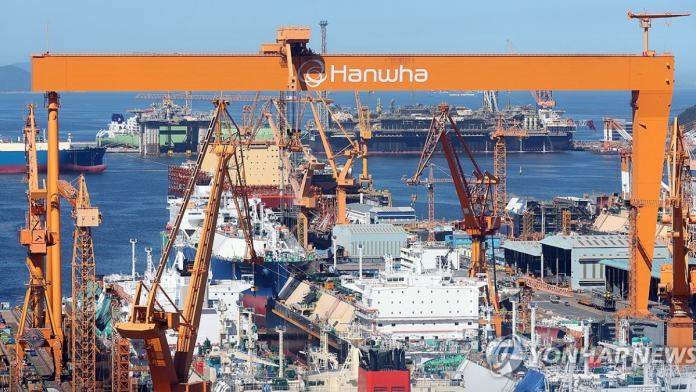China has taken a dramatic step in its ongoing trade tensions with the United States. The country has added five U.S. subsidiaries of South Korea’s Hanwha Ocean to its sanction list. This move has sent the company’s shares in Seoul tumbling over 8% as investors reacted to the unexpected announcement.
The sanctioned subsidiaries include Hanwha Shipping LLC, Hanwha Philly Shipyard Inc., Hanwha Ocean USA International LLC, Hanwha Shipping Holdings LLC, and HS USA Holdings Corp. According to China’s Commerce Ministry, the sanctions took effect immediately. Chinese organizations and individuals are now prohibited from doing any business with these companies. The order is seen as a strong signal from Beijing in response to recent U.S. measures affecting trade and shipping.
The action comes amid growing tensions between Beijing and Washington, with both countries taking steps that affect international trade. The sanctions on Hanwha Ocean’s U.S. subsidiaries appear to be directly linked to the company’s involvement in activities under investigation by U.S. authorities regarding the Chinese shipping industry. This situation highlights the complex and intertwined nature of global shipping, trade policies, and international business.
Trade war 2.0 — China’s rare earth dominance turns minerals into missiles in the U.S.-China rivalry
U.S. Fees on Chinese Ships and China’s Retaliation
The sanctions by China followed a recent decision by the United States to impose steep fees on Chinese ships docking at American ports. These charges went into effect early Tuesday morning and are part of Washington’s effort to monitor and control foreign shipping in its ports. In direct response, China announced a charge of 400 yuan (approximately $56) on American vessels, which started on the same day. This reciprocal action demonstrates the ongoing back-and-forth measures between the two economic powers.
The sanctions target Hanwha Ocean’s U.S. subsidiaries because of their alleged involvement in U.S. investigations into the Chinese shipping industry. China’s statement emphasized that the companies are restricted from engaging in business with Chinese organizations or individuals. The immediate effect is that these subsidiaries may face difficulties in operating smoothly, especially in transactions that involve Chinese partners.
Investors reacted quickly to the news, with shares of Hanwha Ocean in Seoul dropping sharply by over 8%. The decline reflects concern about potential disruptions to the company’s U.S. operations and broader business impact due to the restrictions. Financial markets often respond sharply to sanctions, especially when they involve major international players and significant revenue streams.
TechInsights blocked in China after revealing foreign sources in Huawei AI chips
Expanding Blacklists and Rare Earths Restrictions
The sanctions against Hanwha Ocean’s U.S. subsidiaries are part of a wider set of actions by Beijing targeting foreign companies. China has introduced a new framework to restrict rare earth exports, materials that are crucial for manufacturing electronics, military equipment, and other high-tech products. Alongside this, Beijing has been expanding its blacklist of U.S. companies, limiting the ability of some foreign firms to work with Chinese organizations.
The rare earths restrictions and blacklisting measures are directly linked to recent moves by the United States. Washington had previously threatened to increase tariffs on Chinese imports, escalating tensions in global trade. China described its restrictions and sanctions as “legitimate measures” to protect its national interests.
The sanctions on Hanwha Ocean’s U.S. subsidiaries took effect immediately, creating uncertainty for the company’s operations in the United States. The restrictions prevent the subsidiaries from engaging with Chinese businesses, adding pressure on their revenue and international partnerships. The situation highlights how global companies, like South Korea’s Hanwha Ocean, are affected by the larger trade disputes between two major economic powers.
The ongoing developments underscore the intensity of trade tensions between the United States and China. Hanwha Ocean, a major shipbuilder based in South Korea, has now been directly impacted by the dispute, reflecting how international trade policies and sanctions can have immediate and tangible effects on companies operating globally.


